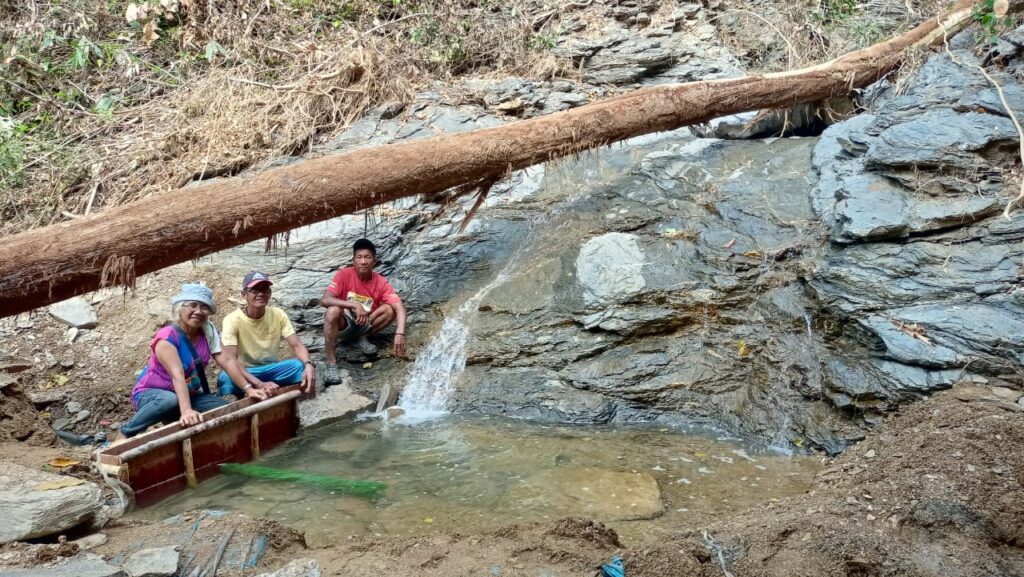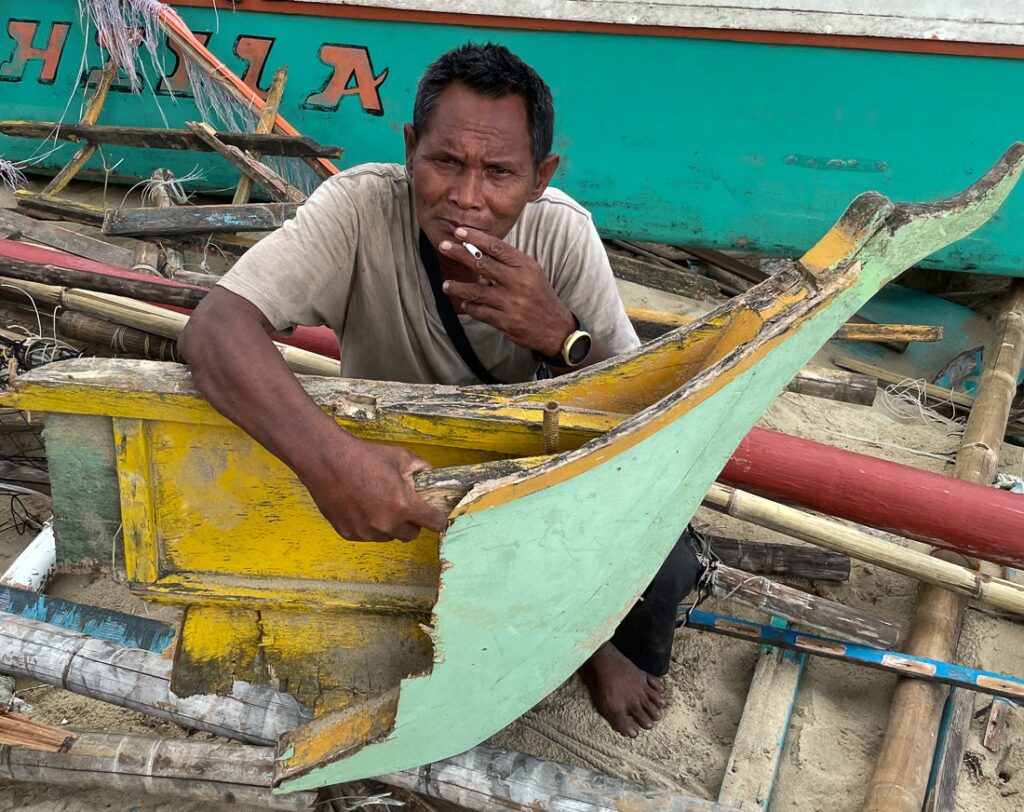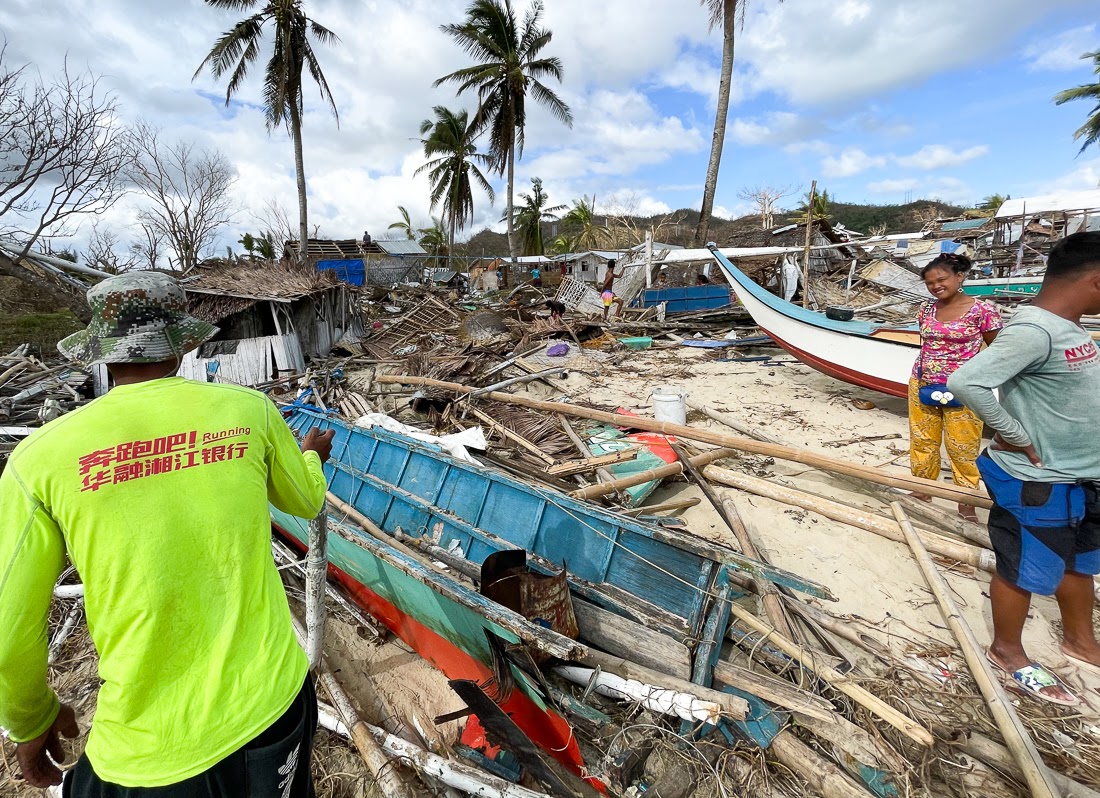12
Jan 2022
Active Rehabilitation: Civic groups partner with Odette-hit communities in Palawan for recovery
by Romar Miranda
One fundamental truth about humanity is the idea that help will come no matter the disaster.
A day after Typhoon Odette (international: Rai) ravaged central and northern Palawan, local communities were in shock because of the unprecedented damages to life and property caused by the typhoon, with a total estimate of more than P7.8 billion.
With the local governments already stretched thin from managing the COVID-19 pandemic, A Single Drop for Safe Water (ASDSW), and Roots of Health (ROH), non-profit organizations based in Puerto Princesa City, Palawan, shifted their focus to augment the government’s relief and rehabilitation efforts.
“The local governments were already tapped out by COVID-19. They have been impacted by the typhoon themselves, but they are mandated to be there for response.”
—Kevin Lee, Executive Director,
A Single Drop for Safe Water
“The local governments were already tapped out by COVID-19. They have been impacted by the typhoon themselves, but they are mandated to be there for response. We augment government efforts by providing capacities in areas they lack. Helping is not rocket science. It’s the right thing to do and we have the capacity,” said Kevin Lee, executive director of ASDSW.
Survivors, not victims
A day after the aftermath of the typhoon, Lee mobilized his team to start the initial assessment of the impacts of Odette, coordinating with the City Disaster Risk Reduction Office (CDRRMO) and Provincial Disaster Risk Reduction Office (PDRRMO).
“We don’t call them victims; we call them survivors. They are not mere beneficiaries, but partner communities.”
—Kevin Lee, Executive Director,
A Single Drop for Safe Water
“One of the overlooked aspects of humanitarian response is how communities react. We don’t call them victims; we call them survivors. They are not mere beneficiaries, but partner communities. They are active participants in their own relief and rehabilitation,” Lee explained.
Since the civic groups started their humanitarian response primarily targeting communities in Puerto Princesa City and Roxas, around 3,850 households have been provided with clean and safe drinking water by installing water systems and providing generator sets to the local water utilities. Nearly 3,000 households have been supplied with water, sanitation and hygiene (WASH) kits; and 551 households received materials to rebuild their shelters.
Local communities are already doing their part in their own rehabilitation, yet there is still a pressing need to help them in recovery through technical assistance and resources.

“When we went to Babuyan (northern village of Puerto Princesa City), the community had started on their own to get their water system back up before we arrived. Relationship building with local officials and communities is important. We ask them what they need and we tell them what we can and cannot do. It’s about showing up and doing something,” Lee added.
Acknowledging that Palawan is not prioritized by the international community because of lack of information and massive devastation in Visayas and Mindanao, the civic groups are aiming to gather at least P80 million to fund the extensive rehabilitation plan. This will also fund the conduct of market mapping assessments to help in the economic recovery and food security of marginalized communities, providing reproductive health services; and boosting access to clean and safe drinking water.
Build thriving communities
Typhoon Odette magnified the susceptibility of vulnerable groups including women, girls and persons living with disabilities, who are still recovering from the intense months of COVID-19, requiring complex, articulated and comprehensive response.
“Women and girls, indigenous peoples, members of the LGBTQIA+ community, the elderly, and persons with disabilities are among the many vulnerable groups more severely impacted by natural disasters including the COVID-19 pandemic. Ongoing relief efforts are focused on mitigating these intersectional vulnerabilities.”
—Amina Evangelista-Swanepoel, Executive Director,
Roots of Health
Amina Evangelista Swanepoel, founding executive director of Roots of Health, emphasized the importance of life-saving and time-critical recovery needs of the most at-risk people living in areas hardest-hit by the typhoon, with heightened risk of violence, exploitation, and abuse.
ROH is constantly monitoring the situation of these vulnerable groups, while incorporating best practices to ensure that disaster response adequately addresses their unique needs, without subjecting them to even more marginalization. It will also be undertaking a gender snapshot profile on Palawan and the effects of Typhoon Odette.
“Women and girls, indigenous peoples, members of the LGBTQIA+ community, the elderly, and persons with disabilities are among the many vulnerable groups more severely impacted by natural disasters including the COVID-19 pandemic. Ongoing relief efforts are focused on mitigating these intersectional vulnerabilities. Pregnant women, for example, need regular checkups and prenatal vitamins, which were already difficult to access even before the typhoon. Senior citizens, whose lives have been so impacted by the pandemic, are even more at risk now with limited access to basic needs and health care. Women and girls, meanwhile, are more vulnerable to unplanned pregnancies and gender-based violence,” Swanepoel said.
Shelter is one of the most critical and essential needs of displaced populations, requiring timely shelter intervention in the form of shelter-grade materials.
Meanwhile, primary concerns with children include water, sanitation and hygiene (susceptibility to diarrhea, access to water and sanitation); health and nutrition (infection prevention and control and prevention of malnutrition among pregnant women and children); and child protection (psycho-social support, prevention of violence, exploitation, abuse and neglect).
“The typhoon decimated the fishing fleet in coastal and indigenous communities. Fishing and tourism were two of the main income earners.”
—Kevin Lee, Executive Director,
A Single Drop for Safe Water
ASDSW and ROH have been partnering with the government in their efforts to meet the needs of those most affected and displaced, responding to crises since 2010, including Typhoon Sendong (international name: Washi, 2011); Typhoon Pablo (international name: Bopha, 2012); Typhoon Yolanda (international name: Haiyan, 2013); Typhoon Vinta (international name: Temin, 2017); and the Marawi Crisis in 2017.

“Recovery is one of the biggest issues which will take a long time. The typhoon decimated the fishing fleet in coastal and indigenous communities. Fishing and tourism were two of the main income earners. High value crops, such as banana, coconuts, and cashew require several years to replace,” Lee said.
According to local officials, the “hardest hit” municipality of Roxas alone recorded damages worth P5.7 billion; Dumaran with P1.1 billion; San Vicente with P49 million; Araceli with P471 million; Kalayaan with P39 million; Taytay with P133.4 million; Quezon with P2.5 million; Cagayancillo with P52 million; Aborlan with P4.3 million; Brooke’s Point with P1 million; Linapacan P137, 000; and Puerto Princesa City with P281.3 million.
After relief and response, rehabilitation has to follow. Building thriving communities in terms of socio-economic resiliency is vital in community-level rehabilitation.
“For now, what’s important is getting Palaweños back to their feet―doing that with dignity where they participate and they understand that this is a compounding emergency,” Lee added.
Any crisis and especially this one calls for a whole-of-society approach, engaging and capacitating all actors, traditional or non-traditional, and integrating them into a coordinated effort that is comprehensive and inclusive.
ASDSW and ROH are accepting donations here.
###
About Roots of Health
Ugat ng Kalusugan (Roots of Health), founded in 2009, works to empower women, young people and families in Palawan, Philippines to lead healthy reproductive lives by providing rights- and results-based educational and clinical services. The organization improves women’s and young people’s reproductive health and decreases the number of unplanned pregnancies and HIV incidence by providing sexuality health education and access to modern contraceptives through a clinical services program.
Roots of Health (ROH) is registered in the United States as a 501(c)3 nonprofit organization. Ugat ng Kalusugan (UNK) is registered in the Philippines as a non-stock, non-profit organization. ROH exists to fundraise for UNK. All program activities take place in the Philippines under UNK. For all intents and purposes, the two are one organization.
In the Philippines, Ugat ng Kalusugan is accredited by the Department of Health (DOH), the Commission on Population (POPCOM), the Department of Social Welfare and Development (DSWD), the Department of Labor and Employment (DOLE), the Provincial Government of Palawan, and the City of Puerto Princesa. We hold Memorandum of Agreements with the Department of Education, Palawan State University and Western Philippines University.
About A Single Drop for Safe Water – Single Drop Consultancy Services (ASDSW-SDCS)
ASDSW-SDCS is a hybrid development and humanitarian organization that works with communities and local governments to: Strengthen Water and Sanitation governance structures and systems, Create community and institutional demand for Water and Sanitation Services as well as building or strengthening service providers organizational, Infrastructure and Technical Capacities. It also manages and implements large scale humanitarian responses as well as building the resilience of local communities and LGUs.





